Many businesses use SimilarWeb for analyses of site traffic to predict competitive advantage, but it is not the only tool available. We will take a closer look at other tools that can represent a great Similarweb alternative.
If users want different features, prices or a new process, SEMrush, Ahrefs and BuiltWith offer strong options.
They provide same or enhanced skills for SEO, competitor analysis, keyword analysis and audience analysis, making them well-suited to replace similarWeb.
Each Similarweb alternative satisfies specific needs.
Some focus on deep SEO analysis, others spend less time on audience measurement or technology profiling.
As the best tool depends on what data a company looks for and its budget, hedging from plans and features differs greatly.
Rank Tracker vs Semrush: Best SEO Tool for Ranking in 2025?
Why Look for a Similarweb Alternative?
Some businesses see similarities to similarweb as not meeting their specific needs because of limitations, prices, or focus.
Different firms require tools that reflect their specific SEO goals, budgets and user preferences.
Limitations of Similarweb
Similarweb has large amounts of data but its accuracy may differ for smaller and niche websites.
The estimates of traffic for large sites appear more reliable for smaller businesses, making it harder for smaller firms to trust.
For SEO-focused teams, the interface is outdated and confusing.
It aims to harness broad market intelligence that could slow the process of SEO for much more mundane tasks.
The tool lacks intuitiveness in comparison to more modern, better priced SEO engines.
Some advanced features are locked behind higher-tier plans.
This can restrict access for users who only need specific SEO tools and incur a steep upgrade cost.
Business Needs for Alternatives

Companies want more focussed tools for SEO activities such as keyword gap analysis, rank tracking, and backlink monitoring.
Some want improved local SEO and content marketing modules that will work smoothly with other platforms.
Also, user management and project limits are important.
Smaller teams need tools that allow several projects and users without the expense of expensive upgrades.
Others want to be able to access Google Analytics and Search Console for faster reporting.
Business users looking to track brand awareness and search trends on AI-based platforms increasingly seek AI-powered features.
Cost and Budget Considerations
Similarweb’s pricing varies by price from $199 a month for basic features to $399 if full SEO access is included.
This is too high for freelancers and small businesses with little budget.
Competitors also often offer low entry prices with monthly programs ranging from $12 to $65 for the most basic SEO tools, such as keyword research and site audits.
High-end Similarweb plans add costs for users and AI capabilities, making budgeting difficult.
Option options may be transparent pricing or better ways to scale costs based upon the actual needs.
Similarweb Alternatives- Pros and Cons to Consider
Pros
- Many Similarweb alternatives exist—SEMrush and Ahrefs come to mind. They both pack a full suite of SEO tools, like keyword research, backlink analysis, and site audits.
- These alternatives often dig deep into website traffic and competitor analysis. Marketers use them to tweak and sharpen their digital strategies.
- Some tools, like SpyFu, zero in on PPC and paid search. They reveal competitor ads and keyword tactics, which is pretty handy if you care about paid campaigns.
- A lot of these SEO platforms throw in free trials or lite versions. That way, you can poke around before deciding to buy.
- Pricing and features vary a lot. Some options fit certain businesses better, and honestly, you might find a cheaper deal than Similarweb.
- Moz Pro and SEMrush, for example, offer insights that help with content marketing. They can also give your keyword rankings a welcome boost.
Cons
- Some alternatives just don’t offer the full suite of tools that Similarweb does. You might end up juggling a couple different platforms to get everything you need.
- Not every option out there gives you the same depth of market intelligence. If you’re after detailed insights into competitors’ website traffic and strategies, you could be left wanting.
- Learning curves are all over the place. Some of these tools get pretty complex, and SEO professionals might have a tough time unlocking all their features.
- Free versions usually come with strings attached. They often restrict access to key functionalities, which can really limit how effective the tool is.
- Pricing? It’s all over the map. Some alternatives start out affordable, but the moment you want extra features, costs can skyrocket.
- Even with big names like Ahrefs and SEMrush, you might not get every metric you need. Sometimes, things like search volume or organic and paid rankings just aren’t there.
Top Similarweb Alternatives Compared
These tools provide a solid SEO foundation, i.e. keyword research, competitor tracking, backlink analysis, and site audits.
They are also price-wise, usability, and AI-powered, allowing them to be customized to the needs of individual users and customers.
1. Similarweb Alternative Semrush
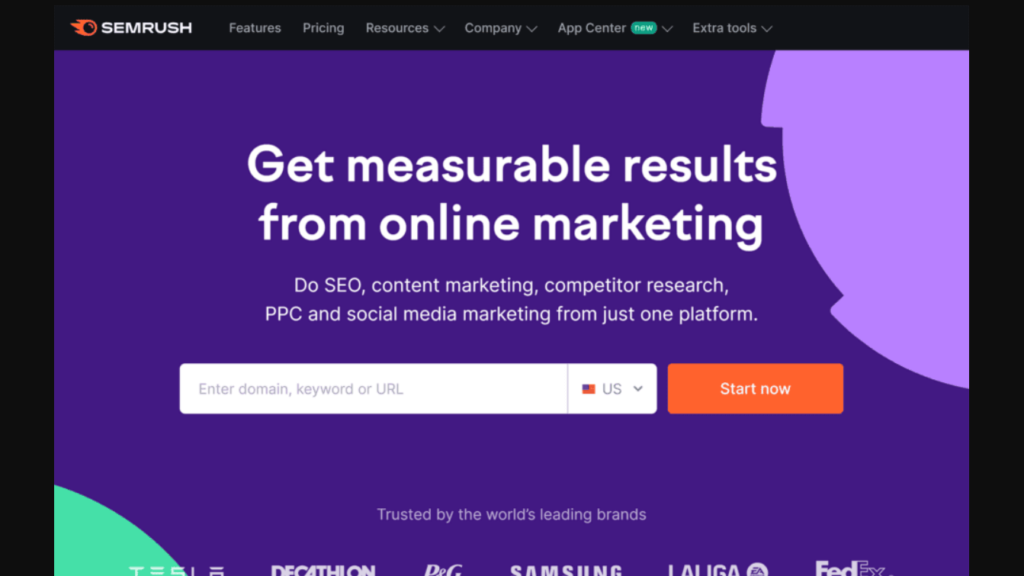
This is an SEO-based platform focusing on competitive research and keyword tactics.
It provides tools to track keyword rank, site audits, backlink analysis and content marketing.
Semrush is a great source of detailed competitor data and an easy AI SEO toolkit.
This includes AI writing assistant and tools for data-driven content recommendations.
Pricing ranges at mid-range prices but gives access to an enormous range of features.
Its interface is modern and user-friendly, designed to help marketers work efficiently.
It is integrated with Google Analytics and other data platforms, for deeper analysis.
2. Ahrefs
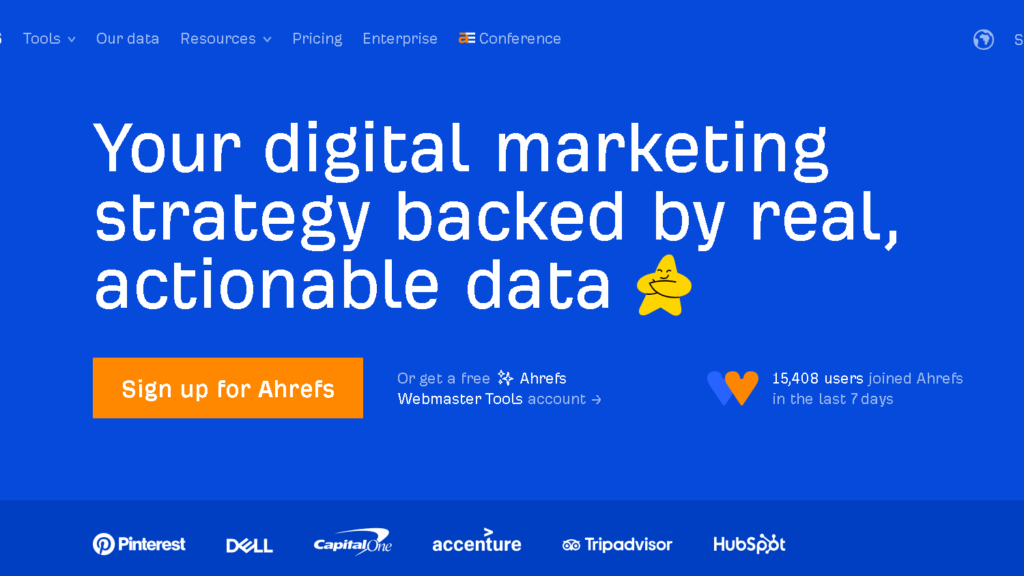
This tool has gained a reputation as a reliable backlink analysis tool and keyword research platform.
It is one of the largest and most regularly updated backlink database, making it a strong linkbuilding player.
This software platform has rank tracking, content explorer and site audit features to help improve sites.
Competent analysis and Keyword gap reports are also handled by Ahrefs.
It offers low-cost plans for freelancers and agencies.
Its interface is simple and easy to navigate; it works based on data clarity over design flair.
Ahrefs has a more limited AI feature than other competitors, but aims for the best accuracy in SEO data.
3. Similarweb Alternative Competitors App
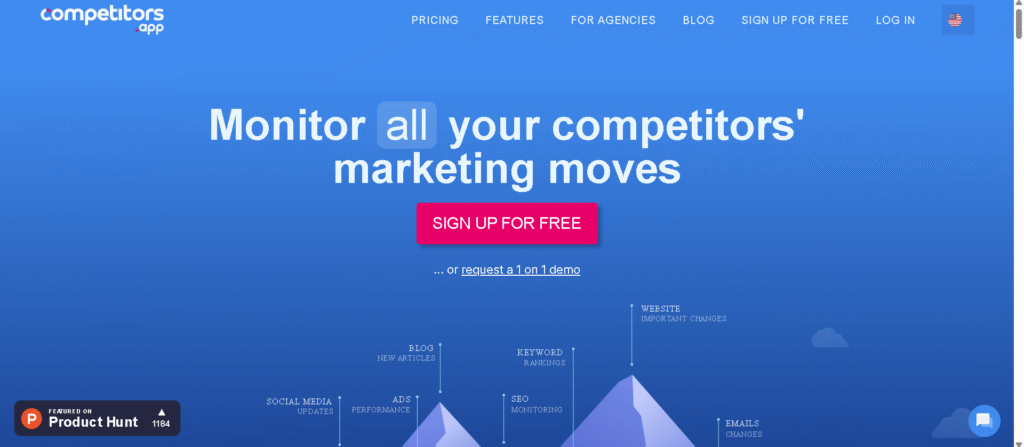
Competitors App tracks competitors’ SEO and PPC practices clearly.
It also monitors keywords on the front page, backlinks on the site and site audit tools.
One significant feature of this is that competitors can track the changes and new strategies in near-real-time.
This helps businesses react rapidly to change in market conditions.
They are inexpensive compared to similarweb and they have a low price range so it’s appropriate for small and medium sized businesses.
The tool is less sophisticated in terms of AI capabilities, but it provides reliable data with an easy interface that is useful for competitive information analysis teams.
4. SparkToro
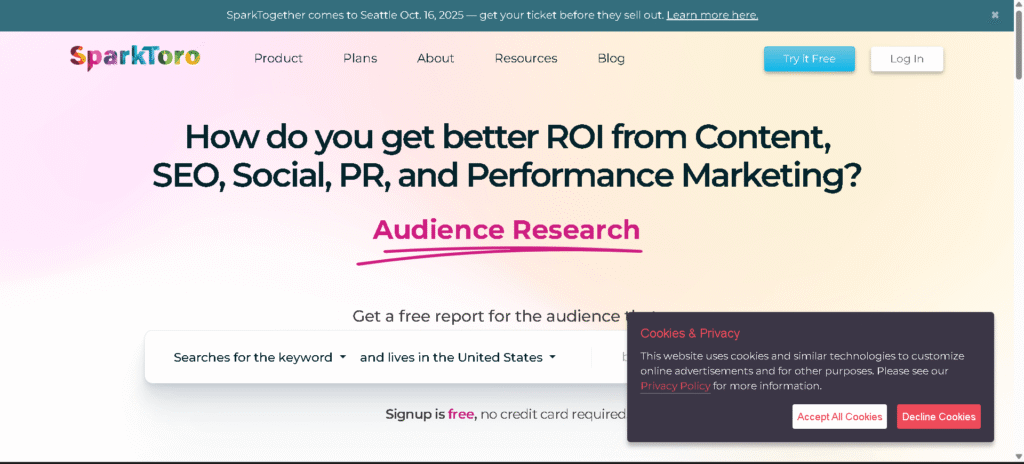
SparkToro is focused more on finding and understanding audiences than traditional SEO metrics and brand awareness.
It allows users to see where their target audience hangs out online and what content/influencers affect them.
SparkToro is great for research into a market and less focused on search traffic than Similarweb.
SparkToro gives you access to AI-powered capabilities and helps uncover trends and audiences but has no backlink capabilities or complete keyword tracking.
The pricing is comparable to other tools given its audience research capabilities.
SparkToro is clean and made for marketers looking for audience awareness or brand perception rather than someone who does a lot of SEO.
5. SpyFu: Deep Dive into Competitor Strategies
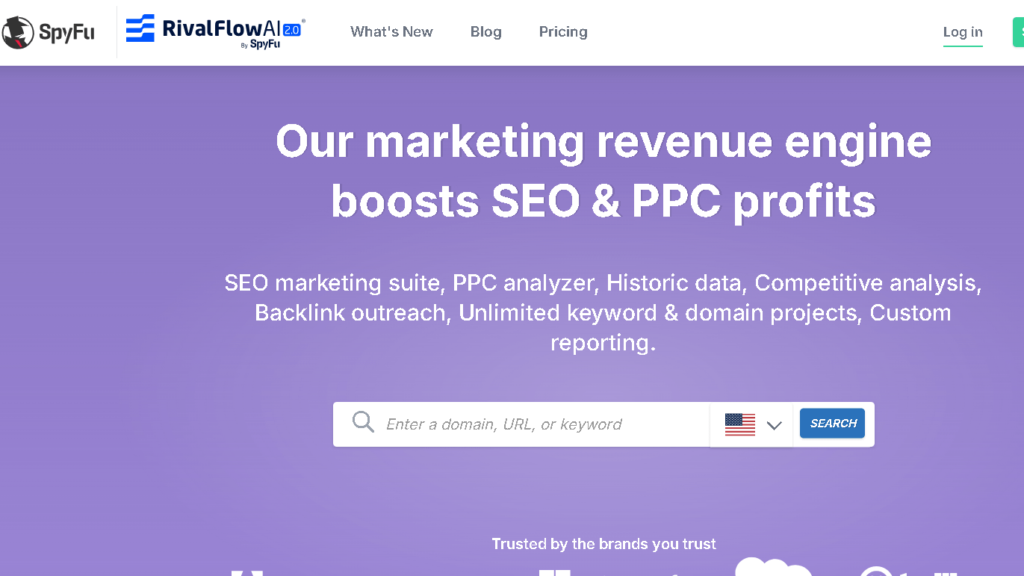
This is a research tool that digs deep into competitor strategies, especially for PPC and SEO. It lets marketers peek at their Google Ads rivals’ keyword choices, ad copy, and ranking history.
Unlike Similarweb, SpyFu really zooms in on the nitty-gritty details of online advertising tactics. This helps businesses tweak their own campaigns with more confidence.
SpyFu gives you a fresh look at how competitors set up their PPC campaigns and handle SEO. Its pricing usually makes more sense for smaller businesses, and honestly, it’s one of the alternatives that delivers solid value.
6. Moz: Reliable SEO Metrics and Insights
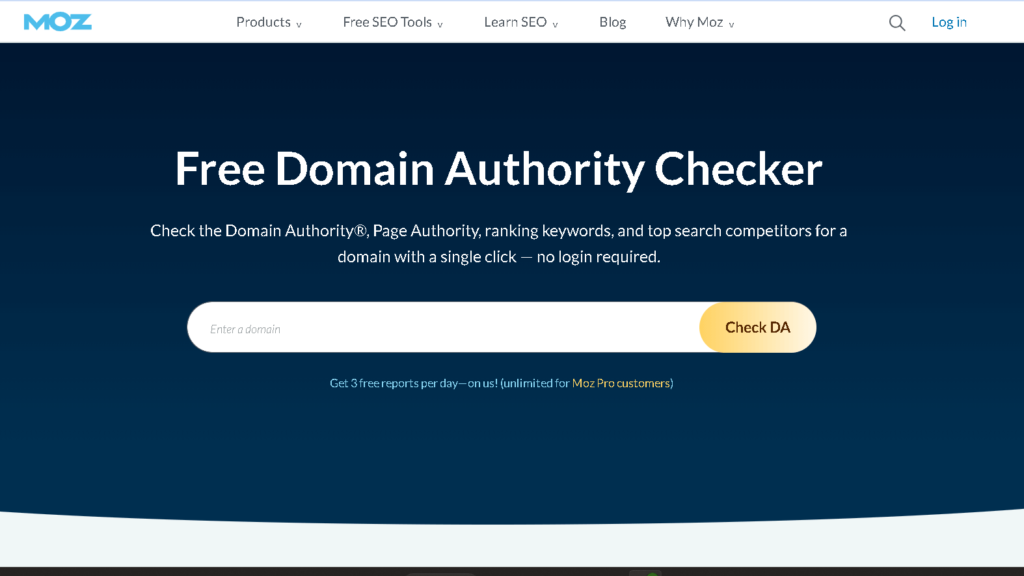
This is a well-established SEO tool provider. People trust it for reliable SEO metrics and insights.
Moz Pro comes with a suite of tools for keyword research and site audits. You can also dig into backlink analysis and rank tracking.
Unlike Similarweb, Moz focuses on SEO-specific data. That helps marketers boost their search engine rankings and online visibility.
With features like keyword rankings, site explorer, and Moz Pro, it delivers a comprehensive SEO toolbox. Digital marketing professionals get a lot out of it.
If you’re prioritizing SEO optimization, Moz stands out as a solid Similarweb alternative. Is it the best solution? Well, that depends on your needs.
7. SimilarSites: Finding Similar Websites
SimilarSites is a research tool that zeroes in on finding websites similar to any given site. That’s especially handy if you’re trying to figure out who else is out there in your niche.
Competitor analysis gets a lot easier with this approach. You might even stumble on some new players you hadn’t noticed before.
Similarweb, on the other hand, gives you a wider look at website traffic and rankings. But SimilarSites? It’s all about surfacing those relevant competitors.
Marketers can use this tool to get a broader sense of the competitive landscape. Maybe you’ll spot a potential partner—or a threat you didn’t see coming.
It’s simple, honestly. If you want a quick competitor research tool, SimilarSites is a solid alternative to Similarweb. Sometimes best practices are just about finding the right tools for the job.
8. Alexa: Website Ranking and Traffic Insights
Alexa Internet, owned by Amazon, gives website traffic insights and ranking data. You’ll also find competitor analysis tools here.
Alexa’s traffic estimates aren’t always as accurate as Similarweb’s. Still, you get some valuable metrics for gauging a website’s popularity and reach.
Its historical data helps track trends and shifts in website traffic over time. For businesses who want a broad overview of the online landscape, Alexa works as a solid Similarweb alternative.
If you’re looking for Similarweb alternatives, you might want to check out options that offer comprehensive insights like Alexa.
9. Serpstat: All-in-One SEO Platform
Serpstat is an all-in-one SEO platform. It offers tools for keyword research, competitor analysis, site audits, and rank tracking.
Unlike Similarweb, Serpstat leans hard into SEO-specific features. It digs deep into keyword rankings and backlink analysis.
Marketers can use Serpstat to spot keyword opportunities. They can also peek at competitors’ strategies and try to optimize their own sites for search engines.
As a Similarweb alternative, it’s known for being affordable. The platform packs in a lot of features for a lower price, which is honestly pretty appealing.
10.Site Explorer: Analyzing Competitors’ Traffic
Site Explorer tools usually show up inside bigger SEO platforms like Ahrefs or Semrush. They let marketers dig into their competitors’ website traffic and backlink profiles.
These tools break down a competitor’s top keywords, traffic sources, and backlink strategies. It’s a level of detail you just don’t get with something like Similarweb.
Where Similarweb gives you a broad overview, Site Explorer tools really zoom in on the specifics. Marketers can grab this info to tweak their own SEO and content plans, hoping for that extra edge.
11. Majestic: Backlink Analysis and SEO Tools
Majestic is a specialized SEO tool that’s pretty well-known for its powerful backlink analysis features.
It digs deep into a website’s backlink profile, showing you the quantity, quality, and relevance of those backlinks.
Unlike Similarweb, which gives you a general overview of website traffic, Majestic keeps its attention squarely on backlink data.
Marketers can use Majestic to spot valuable backlink opportunities and check the SEO authority of different websites.
It’s also handy for monitoring what competitors are doing with their backlinks.
If you’re an SEO pro who’s all about backlink optimization, Majestic stands out as a solid alternative to Similarweb.
Key Features to Evaluate in Web Analytics Tools
Choosing the best web analytics platform? Well, it comes down to a handful of important factors.
You’ll want to think about data accuracy and coverage. User experience and how clear the reports are matter too.
And don’t forget about integrations with other tools—those can make or break your workflow.
Data Accuracy and Coverage

Accuracy: You need accurate data if you want to make smart decisions.
The tool should gather solid metrics on website traffic, user behavior, and what your competitors are up to.
Coverage: You’ll want extensive coverage for a thorough analysis.
Ideally, the tool tracks data from all sorts of sources, pulling from both global and local markets.
Advanced features: Some tools come packed with advanced features, usually powered by AI.
AI can really boost data collection and analysis. It spots patterns faster and digs up smarter insights.
Check if the tool gives you updated, real-time data.
Make sure it captures both organic and paid traffic—don’t overlook either one.
The tool’s compatibility with different devices and platforms also matters for accuracy.
Comprehensive coverage should include mobile, desktop, and social media.
If you miss out on accuracy or coverage, your insights might end up incomplete or even misleading.
User Interface and Reporting

Reporting features need a streamlined, intuitive interface. As business users are often pressed for time, they require easy-to-understand dashboards. Plus, user experience should allow individuals to customize reports with minimal fuss.
The user experience should prioritize at-a-glance visibility of critical metrics and easy customization of reports.
Reporting features should enable easy export of data into common formats such as PDF, CSV, or Excel.
Business users should be able to schedule custom reports for automatic delivery to stakeholders.
Interactive, graphical reporting tools use visuals such as charts and heatmaps. These user-friendly visuals can make data easier to digest.
AI reporting tools use algorithms to provide automated reporting and insights.
Features such as automated reporting can save time and produce more actionable results.
Optimal tools provide a healthy balance of data depth and reporting simplicity.
Integration Capabilities
A web analytics tool really needs to play nicely with other marketing and business platforms. That means it should get along with content management systems, advertising networks, CRM software, social media channels, and so on.
When you can link these up, data moves smoothly between systems. Suddenly, you’re looking at a much bigger, clearer picture of your performance.
It’s also handy for automating stuff—like syncing ad spend or tracking whether someone actually converted from an email campaign. APIs and pre-built connectors usually make this possible.
Before you commit, check if the tool works with the platforms you already use, or if it can be customized to fit your setup. Strong integration options honestly make the tool way more useful than just basic analytics.
Industry-Specific Solutions
Each sector or vertical has its own checklist of requirements. You really need the right tools for the job.
When picking a digital intelligence platform, people look at how deep the data goes. Custom reports matter, too, along with features tuned to what a sector actually needs.
E-commerce teams want better consumer insights. SaaS folks care about product tracking, while marketing agencies focus on campaign performance.
E-Commerce Analytics
E-commerce platforms need tools that track deep customer behavior, not just basic traffic stats.
You want features like product keyword performance and competitor pricing analysis.
Customer journey mapping? That’s another big one.
Some alternatives to SimilarWeb actually integrate better with marketplaces like Amazon or Google Shopping.
It’s also important to track how your email marketing performs.
Tools that measure whether targeted campaigns really drive traffic and conversions can give you an edge.
E-commerce folks also appreciate real-time inventory insights and trend detection—something a lot of generic platforms just don’t offer.
Metrics on zero-click searches and voice commerce? Those are becoming more relevant for online retailers every day.
Platforms that support visual product search analysis and link sales performance reports tend to fit e-commerce needs better than most broad digital intelligence tools out there.
SaaS Monitoring Tools

SaaS companies pay a lot of attention to usage metrics, subscription trends, and user retention data. They also dig into traffic analysis, but it’s not the whole story.
Unlike broad web analytics, SaaS monitoring tools zero in on things like churn rates and feature adoption. It’s all about keeping a finger on the pulse of product health.
A lot of SimilarWeb alternatives come with APIs and integrations. These connect straight into internal analytics platforms, making it easier to see everything in one place.
Teams can then link their marketing moves—like email campaigns—directly to sign-up flows and feature usage. That kind of connection just makes sense.
These tools usually offer competitive benchmarking on product updates and customer feedback. It’s a bit of an edge when you’re trying to keep up.
SaaS firms get a boost from rank tracking that targets industry-specific keywords. Some tools even bring in AI-driven competitor insights, which helps teams figure out where to put their energy in development and marketing.
Marketing Agency Needs

Marketing agencies need flexible, multi-client dashboards. These should pull together keyword research, backlink analysis, and campaign performance.
Agencies care a lot about how easy it is to generate client reports. Customizable templates and automated delivery make a huge difference.
Email marketing data integration matters for agencies juggling cross-channel campaigns.
Platforms that dig into how email traffic behaves and converts on client websites really close the feedback loop.
Cost-effectiveness is a big deal, especially for small and mid-sized agencies.
A lot of agencies look for alternatives with lower starting prices and scalable user seats. SimilarWeb’s higher-tier plans can be a tough sell.
Tools with local SEO features and AI-powered trend analysis help agencies adjust campaigns on the fly. That’s what they want—agility and precision.
AI and Automation in Digital Analytics

AI has really shaken up how digital analytics platforms deliver insights.
Now, automation lets teams track performance and jump on changes fast. That saves time and, honestly, makes things a lot more accurate.
Leveraging AI for Competitor Insights
AI tools can dig through huge amounts of data and spot patterns in competitors’ online strategies.
They’ll pick up on rising trends, keywords, and content gaps by grouping similar search terms. These tools also compare metrics like search intent and keyword difficulty.
That means businesses can benchmark themselves against several competitors at once. Not bad, right?
Some platforms with AI features keep an eye on brand visibility in AI-generated content, like answers you see on ChatGPT or other assistants.
Brands can see how often they show up in those results and tweak their strategies if needed.
AI-driven competitor insights reach beyond the usual data. They add context connected to real-world events and changing demand.
Automated Reporting and Alerts
Automation in digital analytics cuts down on manual work. It generates reports and sends alerts when custom thresholds are met.
AI steps in to summarize complex data into clear, actionable insights. You don’t have to babysit the process, which is a relief.
Teams can keep tabs on traffic sources, keyword rankings, and backlink changes almost in real time. It’s honestly impressive how quickly you can get notified.
Alerts pop up the moment something important shifts, so you can jump in and respond fast.
Automated dashboards make it easy to switch between different data views. This supports ongoing performance analysis without much hassle.
All of this really boosts efficiency, especially if your team is small or juggling a bunch of projects at once.
Selecting the Best Alternative for Your Business

Choosing a tool for your business isn’t just ticking a box. You’ve got to really get what you’re aiming for, and honestly, that’s not always as easy as it sounds.
If you don’t have a plan for switching over, things can get messy fast. The right tool keeps you from tossing money down the drain and actually helps you get more out of whatever platform you pick.
Matching Features to Goals
Businesses should start by figuring out their top priorities. Maybe it’s SEO analysis, traffic insights, or just spotting trends—everyone’s got different needs.
If you really care about deep SEO and backlink data, Ahrefs makes more sense than Similarweb. Similarweb just doesn’t go as deep in those areas.
Want to dig into competitor traffic paths and demographic info? Semrush .Trends gives you detailed user flow maps and audience profiles.
If you need affordable SEO and PPC tools together, Serpstat might be your pick. It covers keyword gap and ad copy analysis without breaking the bank.
Trend-focused teams could check out Exploding Topics. It’s handy for catching emerging market opportunities early.
Jotting down a clear list of must-have features helps a lot. It’ll save you headaches and cut down on endless trial and error.
Migration and Implementation Tips
Switching from Similarweb to another platform? You’ll want a plan that keeps your workflow humming along.
Start by figuring out which reports and data matter most to your team. What are you actually using day-to-day?
Make sure the new tool lets you export or import what you need. You don’t want to lose anything important in the shuffle.
Get your team trained up on the new software early. Learning the interface and features ahead of time cuts down on mistakes and confusion.
Try rolling things out in phases. That way, you’re not throwing everyone into the deep end at once.
If you can, test a trial version or a free plan first. It’s a good way to see if the usability and data really fit your needs.
Check in regularly during those first few months. That way, you can catch any problems with integration or user adoption before they get out of hand.
Similarweb Alternative-FAQs
This section digs into some trusted alternatives to Similarweb. It touches on cost differences and checks out how these tools stack up in features like traffic analysis and browser extensions.
You’ll also find a look at free options. Plus, there are a few community picks from Reddit for web analytics thrown in.
What are the most reliable competitors to Similarweb?
Reliable competitors include Semrush, Ahrefs, Moz, Ubersuggest, SE Ranking, SpyFu, Nightwatch, and Search Atlas. Each one brings solid SEO and competitor analysis features to the table.
A lot of folks lean toward Semrush and Ahrefs for their deep data and really advanced tools. It’s not hard to see why—they just cover so much ground.
Are there any free platforms offering the same services as Similarweb?
Most platforms like Similarweb usually cost money. Still, you’ll find a few that toss in limited free tiers or short trials.
Ubersuggest and SE Ranking both let you poke around with some basic SEO tools for free, though you’ll hit some walls pretty quickly.
Honestly, it’s tough to find any fully free platform that does everything Similarweb can do. Those are pretty rare.
How does the functionality of Ahrefs compare to Similarweb for traffic analysis?
Ahrefs really leans into backlink analytics, keyword research, and rank tracking. You get a deep dive into SEO details, but it doesn’t quite offer the same broad market intelligence as Similarweb.
When it comes to traffic analysis, Ahrefs takes a shot at estimating site visits. Still, it might miss out on some of the wider traffic sources you’d hope to see.
What are the differences in pricing between Similarweb and its competitors?
Similarweb kicks off at $199 per month. If you want more advanced features, expect to pay over $399 monthly.
Meanwhile, competitors like SE Ranking start at around $65. Ubersuggest sits at $49, and Nightwatch goes as low as $12 per month.
Honestly, these alternatives feel a lot more doable for freelancers or smaller businesses.
Which tools offer the best Similarweb-like browser extensions for traffic insights?
SpyFu and Semrush both have browser extensions. With these, you can quickly check traffic estimates, keyword data, and even peek at competitor insights.
Honestly, having these tools right in your browser just makes research faster. They’re pretty handy for daily SEO tasks.
What platforms are recommended on Reddit for web analytics similar to Similarweb?
Reddit users toss around Semrush, Ahrefs, and Moz as top picks for web analytics tools.
SE Ranking and Ubersuggest pop up too, especially when folks want something affordable or simple to use.
People in the community seem to care a lot about accuracy. They also talk about the user interface and whether the features feel balanced.

